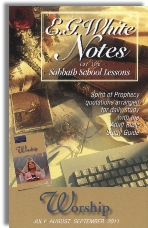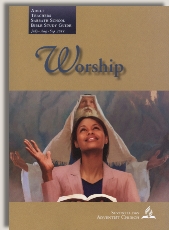|
||||||||||||||
Commentary on "Worship and the Exodus: Understanding Who God Is"
Day 1: Sabbath Afternoon, July 2, 2011 - Introduction
Overview
Today’s lesson begins with Exodus 20:2,3 where God declares He is Israel’s God who brought them out of Egypt and bondage, and they are to have no other gods before Him.
The author of the lesson uses John 4:22 to make the point that many people, like the Samaritans, worship what they do not know. The lesson leads to the questions, do we know whom we’re worshiping? Do we know the Lord whom we praise?
The lesson ends with the statement that the week will look at early accounts from the children of Israel and see how their encounters with God reveal God’s character so we can know whom we worship.
Observations
This lesson, while purporting to understand who God is, fails to see the reality revealed in the Exodus accounts. The memory text merits no discussion, but it is the one point of the lesson that says something profound about God.
God identifies Himself as the Lord who delivered Israel from bondage. He is the Lord God...not merely a god. He chose Israel before they were a nation and brought them out of Egypt as His faithfulness to His own promise given to Abraham over 400 years previously.
It is crucial to notice that God saved Israel and delivered them from slavery before He gave the law to them. In other words, the law was not part of their salvation. He saved them, and then He delivered the law to His already saved people. He didn’t deliver only those who kept the law; He saved all Israel because He chose them, and then He gave them the law as His covenant with them.
God’s identification of Himself as the Lord who brought them out of Egypt and of the house of bondage is the reason He gives them for having no other gods. He revealed Himself to them through a succession of miracles, removing them from oppression and slavery through absolutely no participation of their own. He sovereignly delivered them and destroyed their enemies.
Only when they were safe from bondage did God make His covenant with them. The law was His legal agreement with them; it was not the term of their qualifying as His people.
God chose His people Himself; He made a covenant with those He had already saved.
The Samaritan woman in John 4 did not know the Lord God. She and her countrymen were “half breeds” derived from the intermarriages of the exiled northern kingdom with the Assyrians. They retained certain historic loyalties to the patriarchs and the Israelites’ knowledge of God, but they had a syncretistic religion that combined Israelite elements with pagan rites. They did not know the true God.
We cannot worship God unless we worship on His terms. He sets the terms, and our obligation is to approach Him as He instructs us to approach. The Samaritans did not worship God on His terms...in those days, the terms of worship meant submitting to becoming an Israelite through circumcision.
In the Christian context, we can only know the Lord if we accept His own revelation of Himself through His word. Extra-biblical sources do not reveal the truth about God; only His word does that. As we look at the lesson this week, we must look at the big picture of what God is doing and submit to His word about Himself. We cannot decide how we want to know and worship God; He decides, and we must obey.
Summary
- God reveals Himself as the Lord who delivered Israel from bondage.
- This revelation is the basis for His telling them that they must have no other gods.
- God saved Israel first and gave them the law second.
- The law had nothing to do with Israel’s being saved.
- God chose Israel; He gave His law as His covenant to them after rescuing them in faithfulness to His own promise to Abraham.
- The Samaritan woman and her countrymen did not know God. They had a syncretistic worship that combined elements from Israel’s tradition with the local pagan rites.
- In order to worship God truly, the Samaritans would have had to become circumcised Jews prior to Jesus’ resurrection.
- We can only know the Lord if we accept His own revelation of Himself through His word.
- We must use His word alone to discover who He is; we cannot decide how we want to worship God. He decides; we obey.
Copyright 2011 BibleStudiesForAdventists.com. All rights reserved. Revised June 28, 2011. This website is published by Life Assurance Ministries, Glendale, Arizona, USA, the publisher of Proclamation! Magazine. Contact email: BibleStudiesForAdventists@gmail.com.
The Sabbath School Bible Study Guide and the corresponding E.G. White Notes are published by Pacific Press Publishing Association, which is owned and operated by the Seventh-day Adventist church. The current quarter's editions are pictured above.
Official Adventist Resources
Standard Edition Study Guide Week 2
Teacher's Edition Study Guide Week 2
Easy Reading Edition Study Guide Wk 2
Search the Complete Published Ellen G. White Writings
Please Support This Project


